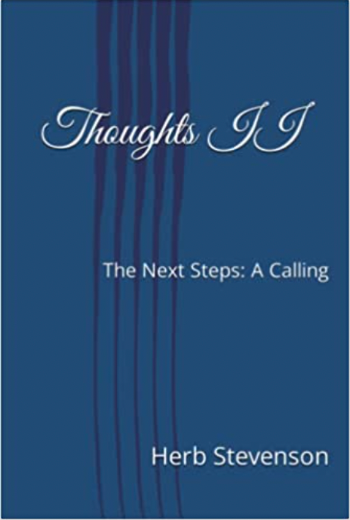

A book by Herb Stevenson, Volume 1. Learn more on Amazon.
Thoughts II:
The Next Step: A Calling

Volume 2 of 3. Learn more on Amazon.
Thoughts III:
Creating The Container

Volume 3 of 3. Learn more on Amazon.
To Lead
Read the article about training with Herb Stevenson in ALN Magazine.
See the article...
The Power of Apologies
“All I want is an apology!”
©Herb Stevenson
April 25, 2016
People who have been hurt or humiliated often hope for an apology. They may hope that an apology from the person who caused them harm will restore dignity, trust, and a sense of justice.
Why Apologize?
A critical component of all relationships is trust. As indicated in the two prior newslettesr, trust requires a deep sense of integrity based on doing the “right things.” An apology can often be the first step to better understanding in a damaged relationship. It says that you share values regarding appropriate behavior towards each other, that you have regrets when you don’t behave according to those values (intentionally or unintentionally), and that you will make greater efforts to live up to your shared standards of behavior. Timing can be crucial.
Whether you are requesting an apology or considering giving one, it is important to realize that a thoughtful apology can mend a relationship while a thoughtless one may cause further conflict.
An apology delayed may be an opportunity lost that can destroy the relationship. For example, executives can get caught in a dilemma when their internal dynamics spill onto the employees. If they suffer from low EQ and more importantly low understanding of impact on others, they can create distrust throughout the organization. Gaining such awareness and development of EQ has become a staple of leadership development. I am not sure that going to the next step of understanding and being willing to apologize for misbehavior has become a generally accepted trait of most senior executives. Rather, many executive continue to see it as an act of weaknesses instead of an act of courage. The latter executives restore order by owning their own foibles.
Why not apologize?
If an apology does not feel sincere, it can further damage the relationship. This has become common because the urban legend of water coolers is that if I say I am sorry, the recipient is required to forgive. Generally, I find that at least 80% of these interactions are insincere acts of getting out of the hot seat. In these cases, it is best to not try the apology.
An inadequate or insincere apology can feel dismissive to the offended party and may heighten conflict.
Sincerity is expressed by what you say, how you say it, and the body language you use. The moment the language shifts from “I” to “you” statements, the apology is moving to blame the other person and the apology will backfire and escalate the conflict.
If the heat of the moment is too fresh and shared, it can be wise to tell the offended person that an apology could be possible if both are willing to participate in some form of conflict resolution, such as mediation, where you can further discuss both of your needs, interests, emotions, and behaviors. Often, a better understanding of the internal triggers of the individuals can be revealed and behavior adjusted.
Why Request an Apology?
There are many reasons we may want an apology (or know that we need to offer one). Knowing your own reason is critically important. Without knowing in specific details of the behavioral wrongs, one can set up a trap for furthering the malady instead of repairing it.
Reasons for Getting an Apology
- To acknowledge how you were offended by the other’s words or actions
- To confirm that the other person acknowledges and accepts responsibility
- To make sure the behavior won’t happen again
- To repair and possibly reconcile the relationship sufficiently to move forward
- To restore your reputation, if maligned by the other person
When you feel someone has offended you, it is important to understand your reaction. It is common to feel embarrassed and angry. Sometimes, you want an apology in order to humiliate or blame the other person, a motive that may provide short-term relief, but can damage a relationship in the long term. If you request an apology, you should carefully consider why you asked, what it should include, and how it should be made. Making it a demand rather than a request often backfires. As noted throughout the article, making an apology is not for the faint-hearted and requires maturity and courage (as well as for receiving one.)
What Type of Apology Do You Want?
If your primary aim is to repair the relationship, requesting a private verbal apology might be most effective to allow the other person to save face. If you feel that your reputation was publicly damaged by the offense, you may feel the need to ask for a written or verbal public apology. Being clear about “what you want” and “what you do not want” from the other person is mission critical.
Roadblocks to Receiving an Apology
You are less likely to receive an apology if the relationship is too conflicted, if there are legal liabilities or potential precedents involved, or if the offender is in a position of power (though positional power is less often excused for bad behavior). Cultural, gender, and age differences can be very important: In certain cultures, if an offense occurred, an apology would be considered absolutely necessary, while in other cultures, apologies are considered a sign of weakness and are almost never offered. It may be that the offender genuinely believes that they did nothing wrong. They may feel that the person requesting the apology is either overly sensitive or is attempting to manipulate them. Regardless, in today’s global culture, it is no longer acceptable to not know cultural differences or to hide behind positional power and titles as excuses for not apologizing when appropriate. For example, one organization’s CEO rotated between two months of being Mr. Nice Guy and one month at each quarter end being an absolute ass. He was driven by quarterly performance that ensured he received his quarterly bonus. At best, his behavior was appalling. Over time, the board recognized that the behavior was abusive and moreover hid the fact that the CEO literally was incompetent. He had no idea how to lead nor set a long term strategy. He had cobbled together a series of acquisitions, none of which increased performance, market share, or long term strategy. When called upon about such issues by three new board members from equity firm holding 25% ownership, the CEO raged. Shortly thereafter the CEO was retired. The CEO had low EQ, no self-awareness, and no inclination to ever apologize.
Responding to an Apology
How you receive an apology can determine the future of the relationship. Sincerity is a key element here as well. You may want to demonstrate acceptance of the apology or extend forgiveness by a handshake or other method, if you are ready to do so. If not, you may want to acknowledge the value of the apology and the offender’s regret and ask for more time to come to resolution. Or, if appropriate, you might want to offer an apology for your own role in the misunderstanding (“I’m sorry for my part, too...”). Generally, this latter issue can be helpful when we know we took a risk and it backfired—we co-created the incident.
Exchange of Apologies
It is common for offenses to occur in the context of other offenses. When people misunderstand each other, they may hurt each other’s feelings by speech, actions, or omissions. Often both people feel misunderstood and poorly treated. When one person can take responsibility and apologize for their portion of harm, it may open up communication and allow the other party to apologize as well.
To truly mend a relationship, it is powerful for people to exchange apologies. Each person acknowledges their responsibility, they reach a shared definition of the harmful behaviors committed by each one, they are both truly regretful, and they create a plan to avoid future misunderstandings. This sharing of responsibility for the relationship is a model of conciliation that restores respect, caring, and trust. Executive teams are beginning to understand that the meetings are not turf wars and should be used to form a collaborative strategy to ensure long term survival.
What Makes an Effective Apology?
Generally, all models suggest some or most of the same traits for an effective apology. None of them include something I’ve learned that can enhance the effectiveness. Prior to requesting or providing an apology, determine what you want and do not want to happen to the relationship. Though stated elsewhere in this article, in this instance, it sets the frame for the apology that is being requested or that is provided. Knowing this intent tends to focus both people towards a more effective apology and potential for reconciliation of the relationship.
In Apologies by Marsha L. Wagner, she notes there are seven elements to an effective apology. In her opinion, an explanation is only effective if combined with all the elements.
- A specific definition of the perceived offense. The person offended and the perceived offender need a clear shared understanding of the behaviors (or omissions) that felt hurtful, rude, or wrong.
- Acknowledging that the perceived offense caused harm. The person offended needs recognition that their pain or embarrassment was legitimate, even if others might have felt differently.
- Taking responsibility. Offenders should acknowledge that, whether or not the offense was intentional, they were accountable for causing harm.
- Recognition of wrongdoing. Offenders need to agree that they were insensitive and made a mistake.
- A statement of regret. While “I’m sorry” is generally not enough for a complete apology, it is a necessary part of any apology and is imperative for re-building trust.
- A promise not to repeat the offense. The offender needs to offer a clear plan for self-restraint, improved behavior, and how to work with the offended person to address possible future misunderstandings.
- An explanation of why the offender acted this way. Be careful! An explanation can be risky as it can sound defensive or seem to be an excuse for bad behavior. Sometimes it is useful for healing a broken relationship and may set the groundwork for re-establishing trust and respect.
- An indication of future intentions. (Example: “In the future, I will try to think about the impact of my words before speaking.” “I hope we can have a relationship of mutual respect.”)
It is noteworthy that even by following the above guidelines, sometimes even well-intentioned apologies can exacerbate a conflict. It may be helpful to consider what elements to include in a statement of apology to make it most effective and constructive.
Remember: Saying you are sorry without providing some details of the above elements often feels insincere.
Mitch Kusy and Louellen Essex, in Breaking the Code of Silence, 2006 applied effective apologies to business. In research completed with executive officers from corporate and other organizations, Kusy and Essex discovered that executive apologies are most effective, regardless of audience, when the following steps are taken.
- Acknowledge the mistake made, framed in the past. Be descriptive and in clear terms about what you did.
- State how your action affected others. Be descriptive and sincere.
- Say you are sorry. Be clear, direct, and sincere about your regrets or lose all trust. No excuses.
- Indicate how you will rectify the situation now and in the future. Be clear, descriptive, and realistic.
Psychological Needs
Aaron Lazare in Making Peace through Apology (Greater Good, Fall, 2004) deepens the understanding of an effective apology by indicating that the apology must satisfy at least one of seven psychological needs of an offended person.
1. The restoration of dignity in the offended person.
2. The affirmation that both parties have shared values and agree that the harm committed was wrong.
3. Validation that the victim was not responsible for the offense. “You did not deserve to be treated that way.”
4. The assurance that the offended party is safe from a repeat offense. “I will refrain from personal attacks.”
5. Reparative justice, which occurs when the offended sees the offending party suffer through some type of punishment.
6. Reparation, when the victim receives some form of compensation for his pain.
7. A dialogue that allows the offended parties to express their feelings toward the offenders and even grieve over their losses.
Generally, these four steps incorporate all of the elements and addresses the psychological needs of an effective method for apologizing for adults. It requires courage to own up to what one has done and it requires respect for self and others to come forth with humility and apologize.
Coaches
As coaches, apologies come into two arenas. First, teaching the client the importance and method for apologizing. Second, when does the client owes you an apology.
More recently, executives are understanding that they are totally responsible for their behavior. Approaching the subject with a client is never easy and requires a strong client-coach relationship. Nonetheless, if as coaches, we’ve been hired to increase the leadership effectiveness of the executive, then it follows that there will likely be times that the subject will arise. In my situation, if there is resistance to an apology through such statements as “he deserved it”. I tend to ask “what did the person deserve and why.” Then, I ask if his or her reaction is familiar—does it happen enough with others to feel familiar? Once this has been discussed, I tend to ask if there might have been other less dramatic methods for dealing with the situation. Finally, I ask if work will be better and easier if the two were less divisive in their day to day situations. As the client unravels the situation, we begin to explore what if scenarios that could be chosen. I leave it to the client to decide if an apology would be appropriate. If interested, I provide the information discussed in the above article.
I am sure we all have had incidents that have felt disrespectful, inappropriate, and/or abusive. Personally, I am tired of clients saying “that’s why we pay you the big bucks...to put up with my ......” Followed by a quasi laugh. I’ve learned that it is critical to good boundary management to address situations directly and immediately if at all possible. It is very easy for executives to feel entitled to different behavioral standards, especially when held to lower standards than a reasonable person would require. In one situation, I created my own slippery slope to a disrespectful relationship. Shortly, after a termination, I supported an executive through the up and down the transition out and into a new job. Support was provided in how to approach different interviews as well as to review and refine resumes. Highly talented and temperamental, he was placed into a new and elevated position quickly in less than six months.
During the transition, I chose to not charge or to inform him that this was a short term process. When he got into a new position, the work was negotiated and he specifically included that coaching for him would be at no charge. I was stunned and then took the time to realize that I had not defined and negotiated the new relationship for the transition or the expectation to return to a formal contractual (with full pay) upon his being hired. Moreover, I felt that he changed the coaching relationship to one of subordination instead of outside contractor. Besides the ethical considerations of the executive requesting special treatment (free services), it felt degrading and disrespectful. I informed him that the new arrangement was not accepted, gave the reasons for their not being acceptable, and suggested we end the relationship and find a new coach if we could not define and negotiate the coaching relationship more appropriately. To date, he has not responded.
I am sure we all have a story or two about bad behavior and apologies. I trust the above guidelines will support you.
We Appreciate Your Feedback
Please let us know if you found this article interesting or useful. We will not submit this information to any third parties.

